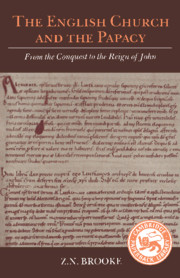Book contents
- Frontmatter
- Contents
- Foreword (1989)
- Preface
- INTRODUCTION
- PART I THE LAW OF THE CHURCH IN ENGLAND
- PART II THE RELATIONS OF ENGLAND WITH THE PAPACY
- Chap. VIII Lanfranc
- Chap. IX William the Conqueror. The traditional outlook
- Chap. X St Anselm. The rise of a papal party
- Chap. XI Henry I. The maintenance of royal control
- Chap. XII Stephen. The “freedom of the Church”
- Chap. XIII Henry II and Thomas Becket
- Chap. XIV Epilogue. From the death of Becket to Magna Carta
- Appendix: English Manuscripts containing collections of Ecclesiastical Law
- List of manuscripts referred to
- Index
Chap. XIII - Henry II and Thomas Becket
from PART II - THE RELATIONS OF ENGLAND WITH THE PAPACY
Published online by Cambridge University Press: 01 February 2010
- Frontmatter
- Contents
- Foreword (1989)
- Preface
- INTRODUCTION
- PART I THE LAW OF THE CHURCH IN ENGLAND
- PART II THE RELATIONS OF ENGLAND WITH THE PAPACY
- Chap. VIII Lanfranc
- Chap. IX William the Conqueror. The traditional outlook
- Chap. X St Anselm. The rise of a papal party
- Chap. XI Henry I. The maintenance of royal control
- Chap. XII Stephen. The “freedom of the Church”
- Chap. XIII Henry II and Thomas Becket
- Chap. XIV Epilogue. From the death of Becket to Magna Carta
- Appendix: English Manuscripts containing collections of Ecclesiastical Law
- List of manuscripts referred to
- Index
Summary
The preservation of the barrier against papal interference with the English Church had, in the time of the first three Norman kings, depended partly on their political strength, partly on the support they received from the episcopate. Henry II had a far more formidable task than they, for he had to exclude the papal authority which had obtained so firm a footing in Stephen's reign, and to rebuild again the barrier which had been broken down. Physical force alone was insufficient; he was much more dependent than his predecessors on the goodwill of the English bishops. Therefore the conflict with Becket came at a most awkward moment for him. Ultimately it ruined his scheme; it was the determining factor which prevented the barrier from being rebuilt. Henry was handicapped, because, though he could reckon on the goodwill of the ecclesiastical officials as a whole, he could not reckon on their undivided allegiance. The doctrines of the Canon Law were known and could not be gainsaid; and for over twenty years a new practice had superseded the old tradition of obedience to the sovereign.
- Type
- Chapter
- Information
- Publisher: Cambridge University PressPrint publication year: 1989

